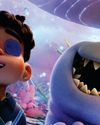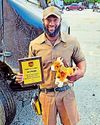CATEGORIES
Kategorien
Neueste Geschichten

3 LITTLE GIRLS FOUND DEAD, DAD ON LAM
Kidnapped daughters bound & suffocated

DIDDY'S DIRT ON J.LO!
Her ex Puff Daddy is smoking mad & ready for revenge

SELENA'S BABY HEARTBREAK
Fears she'll lose Benny if she can't have kids

BOOST YOUR JOY WITH DAILY GLIMMERS!
The simple act of savoring micro moments of happiness is going viral for its ability to soothe your nervous system and boost resilience. Here, easy ways to gather your 'glimmers'—the slivers of sparkle that make life memorable

Nature’s best floral remedies
New research finds that the flowers bursting into bloom right now are packed with natural compounds that do everything from boost energy to lower blood sugar to improve memory over time. From their scent to their seeds, harnessing this kind of 'flower power' can help you feel your best.

Happy 4th of July! with smiles!
Celebrate America's birthday with a deliciously sweet berry cocktail!

ALEX & MATT A Rare Look Inside Their Love Story
The podcast host lets viewers into her relationship in her new docuseries

RENEE RAPP ON TOWA BIRD 'I Worship Her'
Reneé Rapp may have declared she wants everyone to “Leave Me Alone” with her latest single, but she’s most definitely not talking about Towa Bird.

"I love the low prices at thrift stores, but I've heard there are tricks to scoring even bigger savings.Can you let me in on them?"
Great news: There are savvy ways to stretch your dollar even further at thrift stores—if you know what to look for. Here, thrifting experts share their insider secrets that will help you squeeze even more savings from every shopping trip.

SUPERMAN SOARS AGAIN! AS THE DAVID CORENSWET STARS GREATEST AMERICAN HERO
THE BREAKOUT STAR PLAYING THE MAN OF STEEL HAS SPECIAL POWERS OF HIS OWN: TELLING DAD JOKES AND KEEPING A CLEAR HEAD WHILE JUGGLING FAMILY LIFE AND HIS EPIC NEW ROLE

Influencers Aren't Relatable Anymore
These content creators built a platform on being just like Us. But with massive success comes unattainability for their audiences

Tyler & Tate TALKING MARRIAGE
Come October, Tyler Cameron and his girlfriend, Tate Madden, will celebrate their two-year anniversary.

DOLLY PLAYS CUPID FOR KHLOE
Dolly Parton knows a thing or two about lasting love.

Ryan & Blake's FRESH START
London calling! Ryan Reynolds and Blake Lively are reportedly hunting for a home in one of the British capital's most expensive neighborhoods, Mayfair, as they spend more and more time in the U.K.

Julie & Todd's TV RETURN
After being released from prison, Todd Chrisley and his wife, Julie, wasted no time getting back in front of the cameras.

TOM CRUISIN FOR A BRUISIN
Fears his daredevil ways will cost him his health

25 THINGS YOU DON'T KNOW ABOUT ME BY Jodie Sweetin
The Full House alum lets Us in on some of her cherished memories, secret talents and more

WHY KATE WON'T SAVE HARRY
AFTER YEARS OF PLAYING THE ROYAL FAMILY'S PEACEMAKER, PRINCESS KATE FINALLY GIVES UP ON PRINCE HARRY

Dakota's REVENGE DRESS
Nothing says “I’ve moved on” like a revenge dress. Just days after news broke that she split with Chris Martin, Dakota Johnson, who’s currently promoting her new rom-com Materialists, stepped out in NYC wearing a see-through black tulle dress.

WORTH THE WAIT
AFTER TWO YEARS IN A SHELTER, ROXIE THE PUP FOUND HER BEST FRIEND AND MOVED IN TO A HOME MADE JUST FOR THEM

HOUSEWIFE ERIKA SWEPT HUBBY UNDER THE RUG
Tom's pals snipe she cleaned up only after herself

3 LITTLE GIRLS FOUND DEAD, DAD ON LAM
Kidnapped daughters bound & suffocated

BIANCA'S CREEPY COPYCAT ROUTINE WEARING THIN
COMPOSED Kim Kardashian has tolerated ex-hubby Kanye West's wife copying her look — but now the spooked reality queen is fed up with Bianca Censori's constant copycatting and fears the busty babe is becoming a creepy stalker, spies say.

JESSICA JABS NICK'S CRYBABY MEMORIES
Doesn't want least reminder of their time together

HEALTH, HAPPINESS & Keeping the Faith
with Grammy-winning musician, actress and entrepreneur QUEEN LATIFAH

SIMPLE WELLNESS SOLUTIONS
Acid-suppressing proton pump inhibitors (PPIs) can ease GERD symptoms, but the drugs come with side effects. Now, an Indian study suggests a safe alternative:

Nostalgic health boosters!
Pastimes you loved in the '60s, '70s and '80s are popular again. And it turns out enjoying them now improves your wellbeing.

Elio IN THEATERS
Pixar's boy-meets-aliens fantasy is extra-terrific

"I found an easy way to balance my blood sugar!"
Struggling with prediabetes and menopause, Amy Wilson felt hopeless—until she discovered macro tracking. By fueling her body right, she reversed her symptoms and lowered her A1C

"God put me in the right place at the right time!"
While driving his UPS delivery route one day, Raheem Cooper found a woman lying in her driveway, unable to move or speak. After getting her help, the pair became friends, and now he calls her Grandma!
